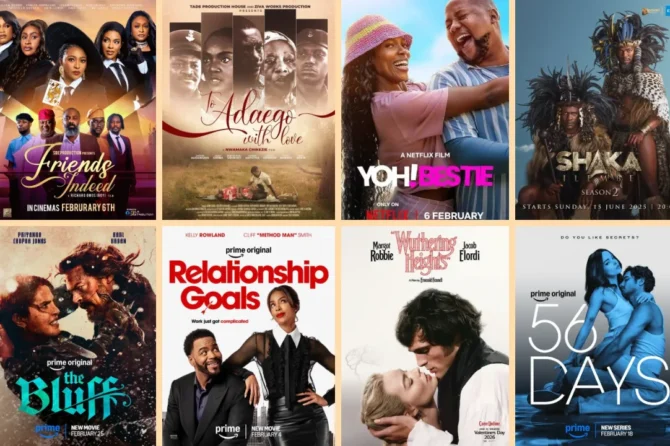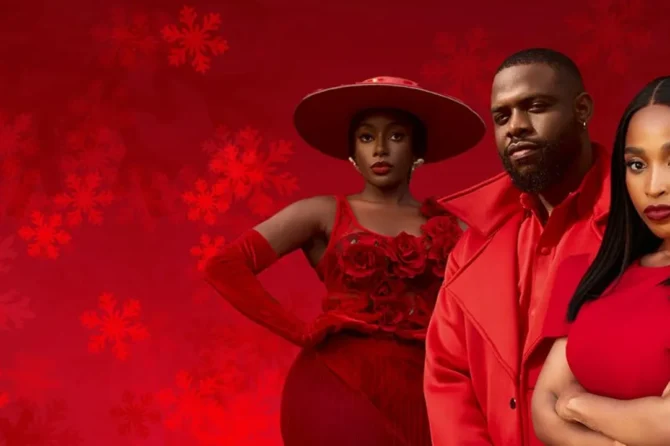
Mofe Ni Mofe heralds two characters traumatized by the complications of love. The lead, Mofe (Lateef Adedimeji), has been jilted by his bride-to-be on the wedding morning and he is determined never to forget that humiliation. Moji (Jumoke Odetola), in what appears to be a series of questionable choices, has been engaged four different times in three years. Both reluctantly find each other in a relationship and they must now brave conflicting ideals if the union will work. While Mofe understandably wants a quiet wedding because he has once been jilted, Moji demands an extravagant affair to show her detractors she has finally found forever. It is a simple situation normally set up for drama. But Mofe Ni Mofe doesn’t solely explore this drama; towing the precarious line of dramedy, it surprisingly amplifies its comedy. What ensues is a film which, although, has its failings, asks a romantic question in an interesting manner.
Related:

Mofe Ni Mofe’s humour doesn’t come through until the second act. The tedium of first act introductions set aside, the film delves into its question; what happens when two people want the same thing differently? Its tone at exploring this conundrum is lighthearted—a constant blue background denoting a recurring warmth, the camera continuously placed at serene angles, even the comedy, although sometimes questionable, never gets out of direction nor physical, always reliant on situation and not characters’ improvisation. Make those people three: The latest of Moji’s bad choices, Meduoye (Tope Tedela), is a selfish, career-obsessed reality TV show anchor who is clearly uninterested in a relationship, and less so a marriage. All three collide in a love triangle that’s set up for real drama when one considers that Moji’s parents are now exhausted by her apparent promiscuity. The film comes in and out of its question smooth and quick, no fuss, questionably pulling away from the drama towards the comedy; which makes writing about it tricky because comedy, unlike drama, must be experienced, and not explained, for it to be fully appreciated.

The stamp of the writer, Mike Adejonwo, shows at the peripheral, where he keeps the comedy. While the situation unravels into humour, Mofe and Moji are never direct participants, keeping the drama hallow. The secondary characters, impressive by how quiet they are rendered in relation to the plot, carry the humour. The three musketeers behind Meduoye (Mike Adejonwo, Debola Ogunshina, and Fayomi Temitope) and Oloye (Abdulazeez Adedimeji) are standout examples of the film’s impressive situational humour. These roles are quiet, sometimes invisible, but important to the sustenance of the film’s comedy as it attempts counterbalance with the drama unfolding elsewhere. And it proceeds into the final act of the film this way, feeling as though the comedy might just have overshadowed the drama. The question the film itself asks, succumbing at the last gasp, to a nearly ludicrous answer.
What one finds at the end of Mofe Ni Mofe is that there are numerous ways to answer a difficult question. This film presents an easier, alternative answer (a controlled narrative that plays on the optimism of classic Yoruba Nollywood). The director, Debola Ogunshina, a veteran at materials of this nature—Borokini, Awọn Aládùn—has honed that answer into a feel-good movie.
Rating: 6/10
You can share your thoughts in the comments section or on our social media accounts.
 Keep track of upcoming movies and TV shows here.
Keep track of upcoming movies and TV shows here.
Side Musings
- Lateef Adedimeji’s brother, Abdulazeez Adedimeji, is absolutely hilarious to watch.
- Uncle Joe, played by Jide Kosoko, as integral as he is to the workings of the plot, is added into the fray a tad too late, making it feel convenient.
- More than anything, it’s a film that opens quickly and closes quickly, no fuss. More of this in Jesus’ name: Amen.
Mofe Ni Mofe premieres in cinemas on September 24.





3 Comments